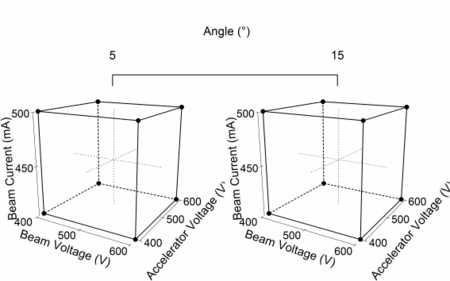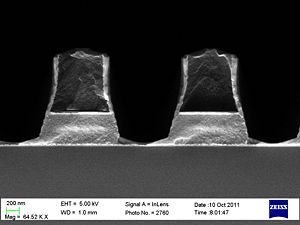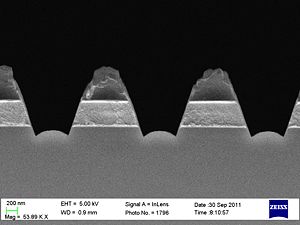Specific Process Knowledge/Etch/IBE⁄IBSD Ionfab 300/IBE magnetic stack etch: Difference between revisions
Appearance
No edit summary |
No edit summary |
||
| Line 37: | Line 37: | ||
|37.5 | |37.5 | ||
|- | |- | ||
|}[[image:KHARA-MLS-DoE.png| | |}[[image:KHARA-MLS-DoE.png|450x450px|thumb|center|DoE for MLS etch]] | ||
===Some SEM profile images of the etched stacks=== | ===Some SEM profile images of the etched stacks=== | ||
Revision as of 07:36, 9 October 2012
Results of Design of Experiments optimization of magnetic stack etching
Process parameters for the acceptance test
To find the optimal parameters, Design of Experiments was applied, with the intervals shown on the figure below.
| Parameter | Ti etch acceptance |
|---|---|
| Neutalizer current [mA] | 450 |
| RF Power [W] | 800 |
| Beam current [mA] | 400 |
| Beam voltage [V] | 500 |
| Beam accelerator voltage | 500 |
| Ar flow to neutralizer [sccm] | 5.0 |
| Ar flow to beam [sccm] | 10.0 |
| Rotation speed [rpm] | 20 |
| Stage angle [degrees] | 5 |
| Helium backside cooling [Torr] | 37.5 |

Some SEM profile images of the etched stacks
Endpoint detection with SIMS
 |
|---|
End point detection is achieved by SIMS, and the etch rate is approximately 25 Nm/min. Resist stripping can be hard due to burned resist, to remedy this try to lover the current. Changing the currect will chance the sidewall angle and new studies of etch profiles will be necessary. For help, discussion and further info please contact Kristian Hagsted Rasmussen.



